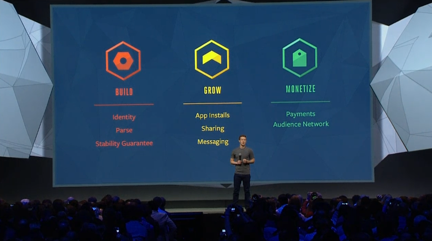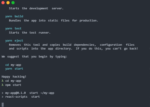At the keynote of Facebook’s F8 developer conference, CEO Mark Zuckerberg introduced the Build, Grow and Monetize strategy for Web and mobile app development while debuting new features and policies for users and developers.
While Zuckerberg made a point of saying this year’s F8 is not about “any shiny new direction or product,” the most significant announcement of the keynote was anonymous login. The new privacy feature allows users to log in and try apps without giving the app personal information right away. The anonymous logins are also synced across device with an anonymous identifier.
Zuckerberg also introduced the ability for users to change line-by-line what they share with a given app, such as e-mail, location or likes, along with anonymous login to get rid of the stigma around “pressing the blue login button.”
“Even if you don’t want an app to know who you are yet, you still want a streamlined process for logging in,” he said. “As a developer this will help more people feel comfortable signing into your apps and engaging with them.”

Transitioning from user engagement with apps to back-end developer features and policies, Zuckerberg announced a new two-year stability guarantee for APIs, a policy to fix major bugs within 48 hours, and API versioning to allow developers a choice in what version of the API they build against for a particular device.
Facebook project manager Ilya Sukhar then took the stage for the “Build” section of the keynote to talk about the new features and updates in Parse, Facebook’s mobile app-creation platform. He detailed how, for developers, Parse is broken up into three components: Parse Core, Parse Push and Parse Analytics.
(Related: Mobile traffic will skyrocket)
Parse Core governs data, server information, user accounts and operations. Under the expanded free pricing tier, unlimited API requests up to 30 requests per second are available to developers.
Parse Push, which is free for 1 million unique push recipients, tailors cross-platform push notifications for any device.
Parse Analytics is a completely free service, and Sukhar announced two new dashboards—Understanding Growth and Understanding Retention—for developers to analyze app and user data. He also detailed the Parse Local Datastore, which provides an offline query mode for apps without a WiFi connection.
“Wherever you’re going now and wherever you’re going in the future, rest assured that we have the platform to get you there,” Sukhar said.
Finally, he talked about a new open-source Parse feature for navigating deep links in mobile apps and browsers, called App Links. It is a set of SDKs that takes a URL link directly to an app instead of leaving the user stuck in a mobile app browser.
Sukhar gave an example of clicking a link in the mobile word processor app Quip to SoundCloud or Goodreads, and going directly into that fully functioning app rather than a browser page not optimized for the experience. The App Links API sends one line of code to another app to navigate back and forth, translating between any Web URL and the mobile equivalent.
“Whatever platform you’re on, it’s one line of code,” Sukhar said.




